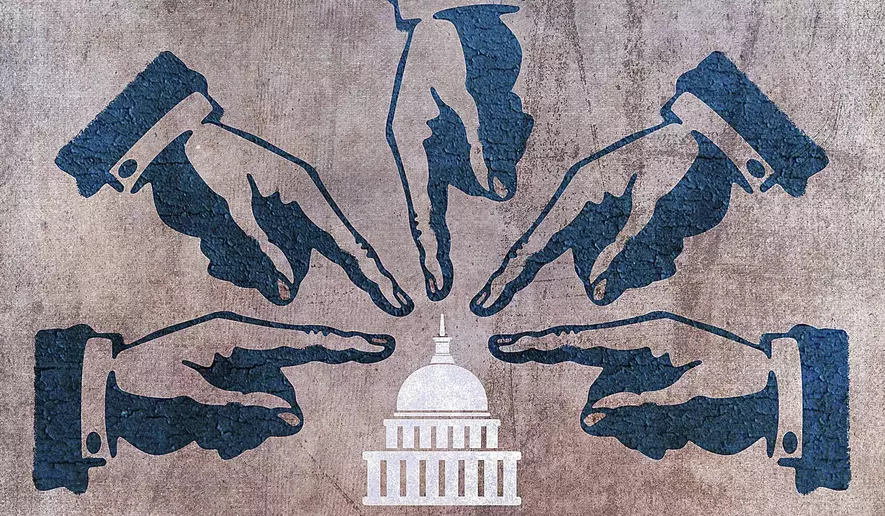HUNDREDS OF BILLIONS IN ‘IMPROPER PAYMENTS’ MADE BY FEDERAL GOVERNMENT
The Government Accountability Office just announced that the government made $236 billion in “improper payments” in 2023 and more than $2.4 trillion in improper payments since 2003 — or about $7,200 for every man, woman and child in the U.S.
If you operated a business and learned that those responsible for accounts payable had been making improper payments — that is, spending company money on things that were not authorized or paying bills that often contained overcharges or were for goods and services that were not provided — you would take immediate action to correct the situation, including terminating those responsible.
Every dollar that the federal government spends is supposedly signed off on by someone in the bureaucracy. They should know what the payment is for and that it is the proper amount for an authorized and legal activity. The failure to do so is, in essence, the misuse of taxpayer-provided money. It would not be possible to have hundreds of billions of dollars in improper payments if the managers in the federal government were doing their job: being accountable.
Unlike in the private sector, federal government employees rarely get fired. DownsizingGovernment.org reported: “Just 0.5 percent of federal civilian workers a year get fired for any reason, including poor performance and misconduct. That rate is just one-sixth of the private-sector firing rate.”
The lack of accountability among government employees is particularly galling given that their average pay is so much higher than in the private sector. According to the Bureau of Economic Analysis, the total compensation cost of the average civilian federal government employee was $143,643 in 2022, which includes salary, health insurance, paid vacation days, pension and holidays. The average private sector employee received only $88,152 in salary and benefits, which means the total compensation package averaged 63% more for government employees.
The IRS, the Securities and Exchange Commission and some other government agencies require that companies maintain accurate financial records and that executives sign documents attesting to the truthfulness and accuracy of financial statements. Failure to do so can result in fines and even jail time. The government enforces these requirements in order to be sure that all required taxes are being collected and for “stockholder” protection.
Taxpayers are the “stockholders” of the government and, as such, should enjoy the kind of financial transparency and protection that the government requires of private companies. Congress should require that all expenditure payments and financial statements emanating from the federal government be signed by the responsible person. If the responsible people are found to have made improper payments, they should be subject to immediate termination.
The same rule should also apply to both military and civilian Defense Department employees, with a couple of exceptions. The Defense Department has “black programs” (most often secret advanced weapons development). By necessity, some of these programs and their attendant expenditures require deception, where total transparency is not possible. Perhaps the only solution is for the executive branch and Congress to do their best to make sure that known, highly responsible, competent people with great integrity and necessary security clearances are charged with the necessary oversight.
Likewise, many intelligence agencies and activities cannot be subject to the normal financial transparency requirements. Many of their personnel are often hidden, including budgets, as they are to some extent in other agencies, notably the departments of Defense and State, but also in less obvious departments such as Agriculture. Maintaining financial and operational accountability is a never-ending challenge. Keeping necessary intelligence operations free of political and financial misbehavior is a continuing problem that large democracies have yet to solve.
The public has also become increasingly aware of how unaccountable some major universities have become to their students, alumni and financial benefactors, as well as to the broader society. There are two major problems with American universities today. The first is that diversity of point of view has been almost eliminated in many leading schools. Recent studies from a variety of reputable sources show that members of the Democratic Party have obtained a near monopoly (over 90%) on faculty teaching positions and academic administrators. From the time of the Enlightenment, the function of the university was not only to transmit knowledge from one generation to the next but also to seek new knowledge through research and open debate — which is now being extinguished.
Another major problem is the decline in productivity. Little progress has been made in the way students are taught, yet university overhead has soared, driving up costs with minimal to no benefit to students. The number of administrators per student has been rapidly rising, in part due to a never-ending increase in government regulations and diversity, equity and inclusion programs.
Several decades ago, I taught at several well-known universities and, at one point, was head of a graduate department. I noticed that, broadly speaking, there were two types of people who sought to be professors: those who were passionate about a particular field of study, whether it was theoretical physics or Eastern history, and “womb seekers,” who sought refuge from the competitive world. Frequently, the main goal of the latter was to acquire tenure so that they could not be fired, no matter how bad their performance was. They also lobbied for light teaching loads with minimal accountability.
American universities will not become great again until the real scholars regain control from the womb seekers, which requires a restoration of accountability. Accountability is equally important in government agencies to be transparent before the taxpayers and to be comparable to the private sector, which are footing the bills.
• Richard W. Rahn is chairman of the Institute for Global Economic Growth and MCon LLC.
https://www.washingtontimes.com/news/2024/jan/8/no-accountability-hundreds-of-billions-in-improper/
© Copyright 2024 The Washington Times, LLC.
